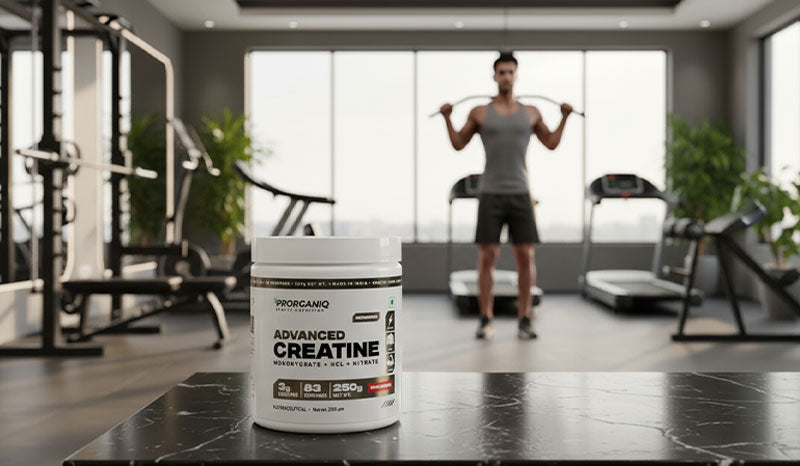Does Creatine Boost Testosterone? Science Explains
In recent years, creatine has earned the spotlight in the Indian fitness and sports nutrition scene.
From gym bros in Mumbai to budding cricketers in Delhi, creatine has become a buzzword in discussions around muscle gain, performance, and energy.
But there’s another, more controversial claim that often arises: Does creatine boost testosterone?
Testosterone: The Hormonal Backbone of Male Health
Before we address whether creatine boosts testosterone, it’s important to understand what testosterone is.
Testosterone is a steroid hormone primarily produced in the testicles in men and in smaller amounts in the ovaries in women. It regulates many crucial functions:
-
Muscle mass and strength
-
Bone density
-
Fat distribution
-
Red blood cell production
-
Sex drive and sperm production
-
Mood and energy
Does Creatine Boost Testosterone?
No, creatine does not significantly boost testosterone levels. It mainly enhances physical performance and muscle growth, not hormone production.
There is some evidence suggesting that creatine may impact testosterone, but the results are mixed and context-specific.
The Supporting Evidence:
A notable study from 2009, published in the Clinical Journal of Sport Medicine, tested rugby players who supplemented with creatine.
After three weeks, their DHT (dihydrotestosterone) levels increased by over 50%, while testosterone remained stable.
DHT is a potent derivative of testosterone, meaning creatine might amplify hormonal effects without increasing total testosterone.
Another study in the Journal of Strength and Conditioning Research (2006) showed a slight increase in testosterone among weightlifters who took creatine for 10 weeks.
However, the rise wasn’t dramatic, more like a minor boost.
The Conflicting Evidence:
Several other studies, including those conducted on college athletes and military personnel, found no significant change in testosterone levels after creatine supplementation. For example:
-
A 2017 review from Nutrition and Health found no consistent evidence linking creatine to raised testosterone.
-
A study in the European Journal of Applied Physiology showed no hormonal changes after four weeks of creatine supplementation.
In conclusion, Creatine might not directly increase testosterone in a significant or reliable way.
However, it could support hormonal activity by enhancing DHT and optimizing training outcomes, which indirectly benefits testosterone regulation.
The Indian Perspective: Why Context Matters
India has unique genetic, dietary, and environmental factors that influence how supplements work.
🌟 Low-Creatine Diet
Traditional Indian diets, especially vegetarian ones, are low in creatine-rich foods.
This means that creatine supplementation may have more noticeable effects in Indian populations compared to Western ones.
If you're a pure vegetarian, your baseline creatine levels are lower, so taking creatine may enhance performance and muscle recovery more dramatically.
This can reduce workout fatigue, which in turn helps maintain optimal testosterone balance.
🌟 Stress and Testosterone
Many Indians, particularly men in urban settings, face chronic stress, sleep deprivation, and poor work-life balance, which are major testosterone killers.
Since creatine improves exercise output, sleep quality, and reduces mental fatigue, it may indirectly support healthier hormone levels.
🌟 Gym Culture and Misconceptions
There’s a common myth in Indian gym circles that creatine is a steroid. Let’s clear this up, creatine is NOT a steroid.
It’s a natural compound that doesn’t alter your hormones like anabolic steroids do.
Still, indirect benefits such as
-
Better workout performance
-
Faster recovery
-
Increased muscle mass
... can all help stimulate testosterone naturally via physical activity.
Indirect Ways Creatine Supports Healthy Testosterone Levels
Even if creatine doesn’t spike testosterone like some might hope, it still offers multiple indirect benefits:
✔️ Enhances High-Intensity Training
Creatine helps you lift heavier and train harder, which stimulates natural testosterone production.
Compound exercises like squats, deadlifts, and bench press are proven to boost testosterone, and creatine fuels these workouts.
✔️ Reduces Cortisol (Stress Hormone)
Studies suggest that creatine may help reduce cortisol, the stress hormone that opposes testosterone.
In India’s fast-paced urban life, stress reduction is critical for hormone balance.
✔️ Supports Brain Health and Mood
Creatine has been shown to improve mental clarity, mood, and reduce symptoms of depression, all of which are tied to hormonal health.
Mental wellness plays a big role in maintaining optimal testosterone.
✔️ Improves Sleep Quality
Although research is still emerging, some evidence suggests creatine can improve sleep quality and recovery, both essential for testosterone production, which peaks during deep sleep.
In essence, creatine creates the right environment for your body to produce and maintain testosterone levels more efficiently.
Conclusion
In the Indian fitness scene, there’s a growing curiosity about natural supplements that work.
Creatine is one of the most researched and reliable performance enhancers available, but it’s not a miracle testosterone booster.
If you’re struggling with low energy, poor workouts, or mood swings, creatine can help you optimize your physical and mental performance.
This, in turn, can lead to better hormone balance over time.
Instead of relying on shortcuts or testosterone boosters with questionable safety, it’s better to build a sustainable lifestyle:
-
Train regularly (especially with weights)
-
Eat enough protein, healthy fats, and micronutrients
-
Sleep 7–8 hours a night
-
Manage stress with mindfulness or yoga
-
Supplement smartly with creatine as a support, not a cure
Creatine is not a testosterone hack, but it's an excellent tool in your fitness toolkit.
If you’re aiming to become stronger, leaner, and healthier, especially as an Indian man, it’s worth considering.


